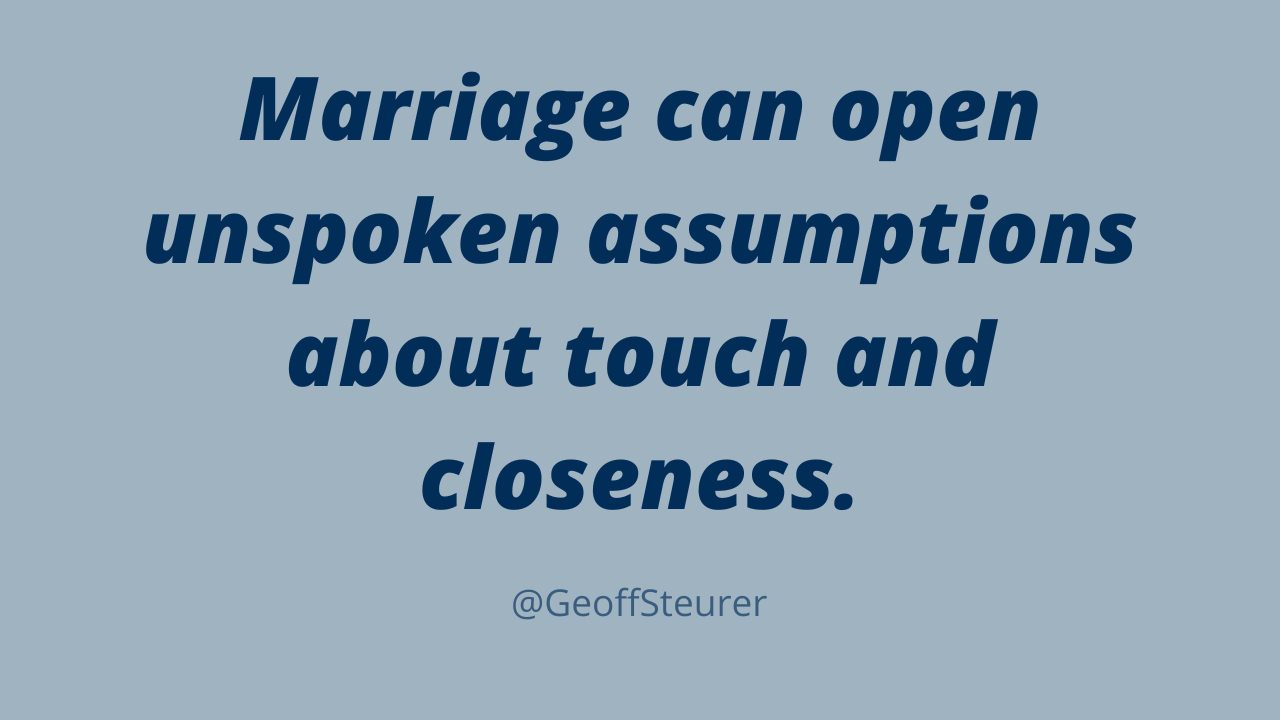Q&A with Geoff: How do I help my wife become more physically affectionate?
Nov 09, 2022
Question
My wife and I have been married for two years. In many ways, we have a great marriage. I love her and I know she loves me. She has a daughter from a previous marriage who has a good relationship with me, her stepdad, and we are expecting a child of our own in the coming months.
The problem? She doesn’t like physical intimacy with me. Like, at all. She will agree to sex, on occasion, because she says she feels sorry for me. But I’m not too concerned about the sex part of our relationship. It’s anything else of a physical nature that typically indicates we have a relationship.
She hates kissing. She won’t hug me. If fact, she gets mad if I hug her unexpectedly. We don’t hold hands. She doesn’t like to “cuddle” or be physically touched like that, whether it’s in bed or watching a movie or whatever. And I want all those things. So, the problem is, we have different views and expectations of what our marriage should be like, physically. Personally, it’s hard not to feel rejected, time and time again.
As an aside, she had some family issues growing up and suffered physical abuse from her ex-husband, she tells me. And growing up, she was always sternly warned from her family not to be too close to boys, and she would be punished if she did (my wife grew up in a more culturally conservative, southeast Asian culture).
So some of that surely carried over into our marriage. But she continues to act like that, even though we are now husband and wife, and I treat her with love and respect, to the best of my ability. I’m not perfect, sure.
Answer
Marriage is full of surprises that test us in unexpected ways. Bringing together two different people from different backgrounds is guaranteed to produce a lifetime of discoveries. It’s also guaranteed to produce plenty of frustration. How we handle differences in marriage is often more important than the differences themselves.
Sure, there are some extreme differences that might require the marriage to end, but most differences aren’t about right and wrong. It’s important to remember that differences in marriage are an invitation to truly see ourselves and our spouse in new ways.
I recognize that this particular difference involves feeling rejected by your wife. It can be terribly difficult to tolerate your differences and stay curious when you’re feeling unimportant. All humans need touch to thrive, so it can feel unbearable to spend your days longing for closeness while pushing back fears of rejection.
I see you’re working hard to make space for her experience while trying to honor your need for closeness. It sounds like she’s also trying to do her best to accommodate your preferences, even though it’s clearly difficult for her.
Please note that your wife’s experiences in her family of origin and her first marriage aren’t simply an aside that should be noted. Instead, it’s likely they’re experiences that have reorganized her reflexes around closeness. If she was promised by her parents that she would be punished for being close to boys and then experienced physical abuse in her first marriage, it’s possible she has trauma around physical touch.
It’s worth inviting her to explore this with a mental health professional who is trained to diagnose and treat post-traumatic stress disorder. Reassure her that the goal of treatment isn’t to make her more physically affectionate. The goal is to help her heal her body, mind and spirit from the impact of physical abuse. Then, she’ll be in a healthier position to determine how much touch she wants to allow into her life.
Remember that healing from trauma, especially physical and sexual abuse, encourages the victim to regain control over how and when they are touched.
Just because you’re now husband and wife doesn’t switch off the impact of the abuse and messages about physical closeness. In fact, getting married could have made the prospect of being touched more frightening for your wife. Marriage can open unspoken assumptions about touch, closeness and access to her body that could have unintentionally re-traumatized her.
Instead of trying to fix the touch issue by increasing the frequency of touch, I encourage you both to understand and heal the impact of her previous experiences in her family and first marriage. Trauma responses can look illogical without deeper understanding. There is room for both of your needs, but I suspect this isn’t a simple choice on her part to be more physically affectionate.
The way you see her and her struggles will make all the difference in your healing as a couple. If you view her as someone who needs to be fixed so she can offer you more touch and affection, then she’ll like see you as one more person who wants to take something from her.
On the other hand, if you are filled with compassion for her struggle to feel safe with physical closeness, you can advocate for her healing. You already know that the loving touch you crave cannot be coerced, threatened or pressured.
There’s nothing wrong with wanting to be physically close to your wife and I hope you can continue to stay curious and loving toward her despite your great pain. Work on this together as a couple instead of treating it as a solo need that she needs to figure out for you.
Continue building on the loving foundation you’ve both established and gently invite her to work toward healing any blocks that prevent her from receiving the connection she also deserves in her marriage.
FREE: 3 Steps to End Your Marriage Argument
Download my free PDF guide and start making real progress to healing
We hate SPAM. We will never sell your information, for any reason.




